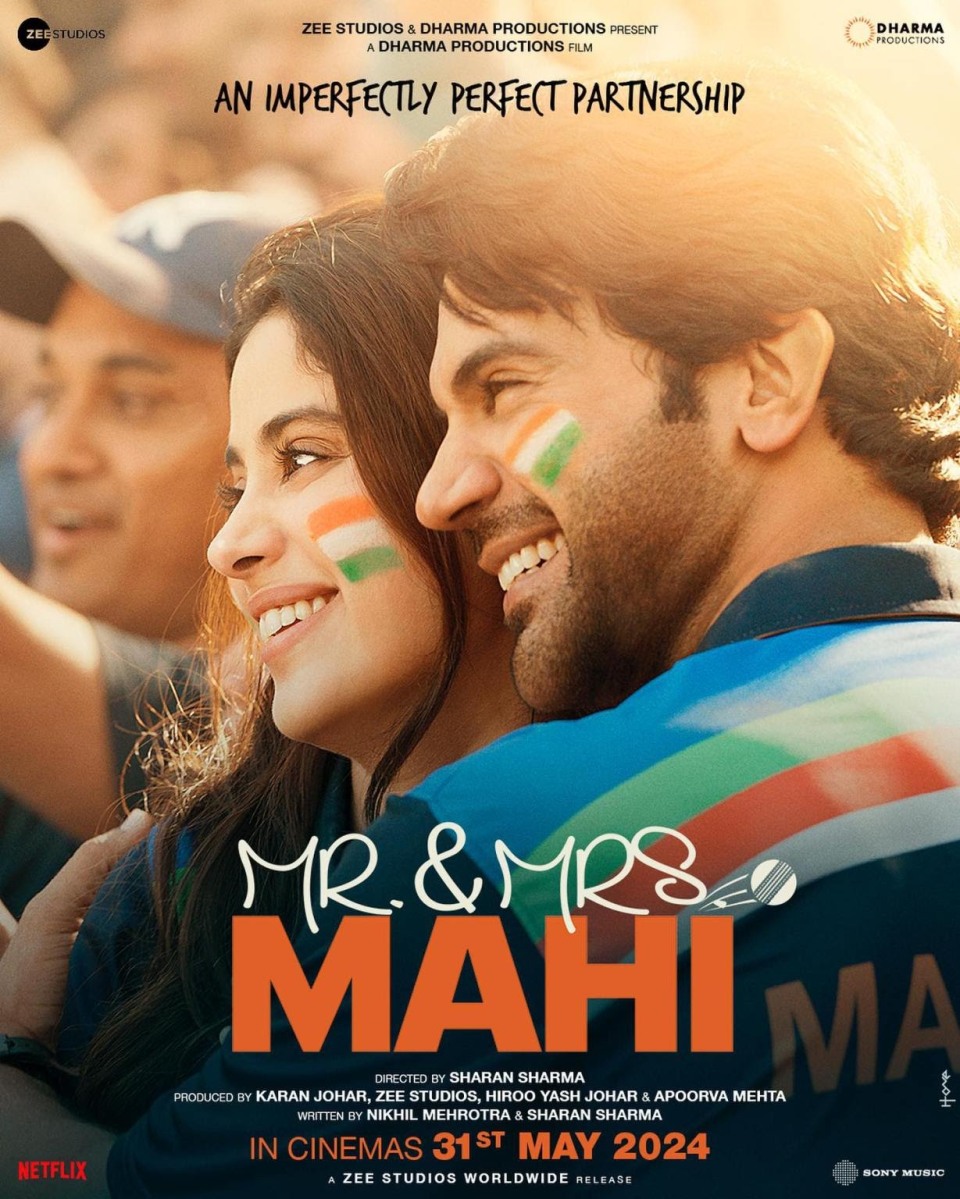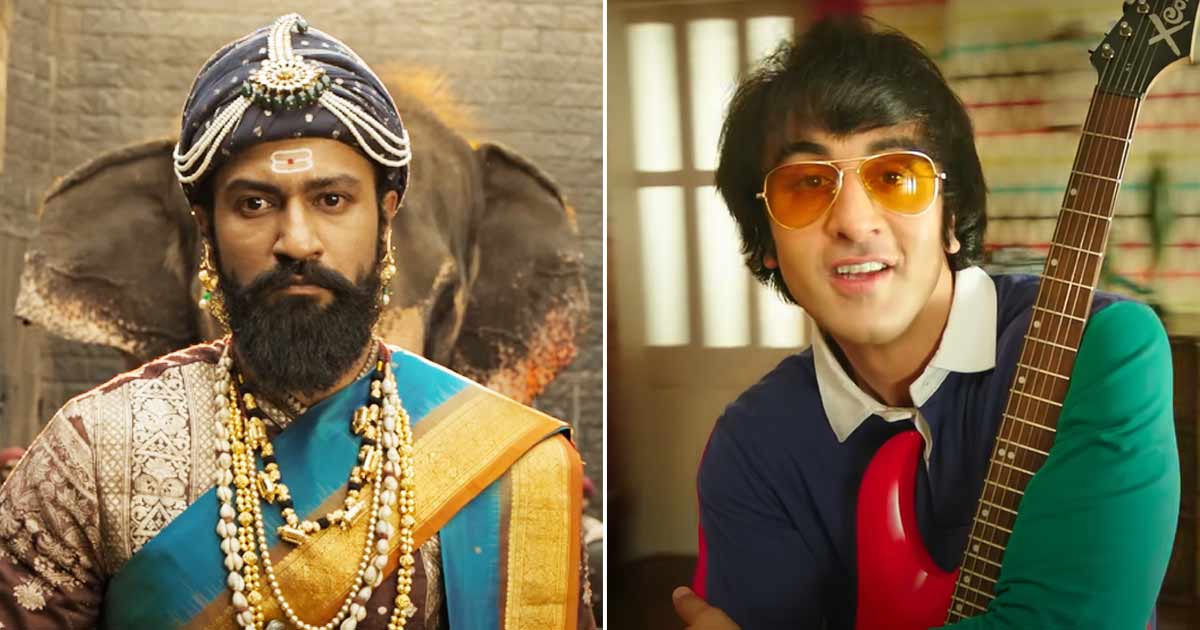
There’s a ‘Mahi way’ to success, but happiness only comes from within – Beyond Bollywood
Though the Sharan Sharma directorial partly triggers the Abhimaan [1973] nostalgia, it’s a fine examination of human relationships, individual dreams, insecurities and setbacks. Stellar performances by Rajkummar Rao, Kumud Mishra, and Zarina Wahab enhance the film’s impact.
Rating: ⭐️⭐️⭐️ (3 / 5)
By Mayur Lookhar
At the promotional event for the upcoming dubbed Hindi version of Aranmanai 4 (2024), seasoned South cinema actor and producer Khushbu drew applause when she stated that behind every successful woman is a man with a golden heart. She heaped praise on her actor, writer, and filmmaker husband Sundar C, revealing how he has always supported her in life and career.
A few hours later, we witnessed such a man in Mahendra Agarwal, a failed sportsman determined to help his wife Mahima become a successful cricketer. Albeit reel, we felt Mahendra was just like Sundar C. However, his insecurities eventually consumed him, naturally creating a rift in his relationship with his wife.
We come to the insecurities later. The trailer of Mr. & Mrs. Mahi didn’t seem convincing. It reminded us of Aamir Khan’s catchy dialogue from Dangal [2016]. “Medal toh medal hota hai. Ab chahe woh chhora laave ya chhori.” Oh dear, is Mr. & Mrs. Mahi going to be another film where a man wants a woman to live his dream?
Thankfully, there’s no imposition of will here as Mahendra, aka Mahi [Rajkummar Rao], inadvertently discovered his wife Mahima’s talent [Jahnvi Kapoor]. The scene unfolds as Mahendra is dejected that his plea for a coaching role is turned down by his former coach. This comes after Mahendra had arrogantly rejected the coach’s offer just two days prior, even berating Beni Dayal Shukla [Rajesh Sharma]. During their conversation, a tennis ball shatters the glass and lands in Shukla’s cabin. An agitated Shukla steps out in anger, questioning who’s striking the ball so hard, with Mahendra following closely behind. Both men are stunned to learn that Mahima, who eagerly seized the chance to hold the cricket bat, is the one striking the sixes.

Mahi doesn’t secure any coaching job, but he believes he can help his wife Mahima, aka Mahi, achieve wonders. (Couples with common names are rare, but one famous example is former cricketer Navjot Singh Sidhu and his wife Navjot Kaur.) It’s worth noting that although Mahima is crazy about cricket, she never thought she could pursue it professionally. Her father’s wish was for her to become a doctor. Excelling in academics, Mahima eventually landed a job as an assistant to a top surgeon in Jaipur, obediently following her father’s wishes. Despite their arranged marriage, Mahima had the final say. The groom’s family had concealed Mahendra’s unsuccessful cricketing career, which he revealed a few days before the wedding. Mahima appreciated his honesty immensely.
Surely, Mahendra was well on his way to be playing a Sundar C in this reel world. Then the Abhimaan [1973] nostalgia grips you. The Hindi film itself was loosely inspired by the Bengali film Bilambita Loy [1970].
Understanding Mahi’s insecurities requires delving into his past. In his heyday, Mahendra Agarwal was a consistent state-level cricketer, but he became desperate for a berth in the national team. During a crucial game attended by a national selector, Mahi’s self-centeredness led to significant losses for both his team and himself. This experience left him disillusioned, without the cockiness that once defined him. Whether in sports or life, it’s common to lose perspective when at the peak of success. The illusion of invincibility leads one to believe that success will always come effortlessly. While this mindset may suffice in certain professional domains, sports serve as a stark reality check. Setbacks naturally shake one’s confidence. Mahi finds himself in tears after his father breaks his bat and instructs him to report to the family’s Legendary sports goods store at 8:00 AM the next day.

That look on his face, jeez, the man looks physically and mentally distraught. Fast forward to the present day—2018 in the film—Mahi appears like a man resigned to his fate. The vicissitudes of life, career, and personal setbacks can profoundly shake one’s confidence. Today, Mahi cuts a sorry figure, barely able to lift his spirits or morale. Rajkummar Rao wonderfully portrays this shattered soul. In many societies, a man’s respect is often equated with his success. Here, Mahi seems to be enslaved by his father’s expectations.

Hardayal Gupta (Kumud Mishra) never misses an opportunity to put his son down. However, he takes pride in his other son, Sikander (Arjit Taneja), a popular social media star. Phew, didn’t poor Rajkummar Rao endure such a claustrophobic family atmosphere in Made in China (2019)? He was brilliant in the Mikhil Musale film. Rao is equally convincing in this Sharan Sharma directorial. Starting off as a cocky character, the setbacks break down Mahi. There is renewed vigor in him as he backs Mahima, before his insecurities get the better of him again. Mahi experiences an experience a gamut of emotions, and Rao is convincing in every shade.
Cricket connoisseurs, however, may find themselves bewildered by Mahendra’s ability to predict the outcome of a delivery simply by observing a bowler’s hand. Additionally, Sharma could have considered more creative team names for the club-level game between Achiever’s Club and Rao’s team—was it called Shining Starz?

Mahima is the true dream girl. How many women would support a man whom society labels as a loser? By now, Jahnvi Kapoor would have made peace with the scrutiny that accompanies every opportunity. She has struggled with consistency, but it’s also true that Jahnvi is an honest trier. We felt Sharan Sharma got the best out of her limited abilities in the aspirational film Gunjan Saxena: The Kargil Girl (2020). Critique her performance, but insensitive remarks about her looks and screen presence are unwarranted and distasteful. With the primary focus here on Rajkummar Rao, Sharma has seamlessly integrated Jahnvi into this screenplay. From striking the cricket ball to playing the humble wife, Jahnvi is fairly competent in her portrayal.

Sharan and his co-writer Nikhil Mehrotra have diligently observed women’s cricket in India. Unlike the men’s game, women still don’t have first-class cricket, meaning that grassroots-level cricket consists of limited overs formats. T20 cricket serves as a significant incentive for young women to pursue the sport, as exemplified by players like Shafali Verma. Moreover, India and the wider world of cricket have numerous stories of women resurrecting their cricketing careers post-marriage. Shobana Asha made her India debut at 33. Mahima’s journey will therefore resonate with women cricketers not only across the country but also globally.
The final state-level game between Punjab and Rajasthan features numerous batters, but we only witness one bowler in action. Much like it was incorrect to categorize Gunjan Saxena: The Kargil Girl as a war film, it would be naive to view Mr. and Mrs. Mahi solely as a sports drama. This is fundamentally a story about relationships, individual dreams, setbacks, insecurities, and resurrection.
It also sheds light on the role of a coach, illustrating how it’s often a thankless job. The successful coaches are content to remain in the background, while the insecure ones constantly seek validation.

Sharma’s protagonists are impressive, but it’s the two seasoned actors Kumud Mishra and Zarina Wahab who steal the show with their flawless performances. Mishra’s Hardayal owns the most prominent sports goods shop in Jaipur, yet he doesn’t appear particularly interested in sports. Isn’t there a saying that a trader doesn’t consume the products they sell? He, however, never misses taking credit, even when it’s undeserved. A late bloomer, Mishra puts his all into every character he plays. From expressions to dialogue delivery, this is simply another tour de force from the master Mishra. However, we didn’t need to see Mishra hyperventilating and popping pills to ease his blood pressure. Ah, we saw enough of that in Mission Raniganj (2023).
Zarina Wahab may have limited screen time, but her portrayal has the most profound impact on the narrative. It’s Geeta Agarwal (Wahab) who imparts wisdom to her son Mahi, likening a good coach to a selfless mother who serves her family without expecting anything in return. The quality of writing and dialogue in these moments establishes a strong emotional connection. Wahab is truly delightful to watch. Having tumultuous personal experiences while steadfastly supporting her family makes her the perfect choice to embody Geeta Agarwal.
While it’s common to see parents imposing their dreams on their children, one shouldn’t lose sight of the economic hardships prevalent in a populous country like India. Sharan Sharma’s film fails to reflect this aspect. Additionally, if Hardayal is furious after his son Mahi quits the family job to coach Mahima, it’s surprising that the couple continues to reside in the same house. There was an opportunity for Mr. & Mrs. Mahi to move out, which would have added more authenticity to their struggle. Furthermore, Sharma doesn’t delve into the widened rift between Mahi and his father.

Mr. & Mrs. Mahi is a film all about its people. It delves deep into emotions and conflicts, leaving little space for music. The late Aadesh Shrivastava is honored with a verse [Dekha tenu pehli pehli vaar ve] from his popular composition Say Shava Shava from the Dharma Production film Kabhi Khushi Kabhie Gham (2001), recreated in this film. Mind you, these lyrics were inspired by Shazia Manzoor’s song Batiyan Bujhai Rakhdi. The ghazalesque track Tu Hai Toh that plays during the end credits is very soothing to the ears.
The ‘Mahi’ in the film is not just inspired from the great former India captain Mahendra Singh Dhoni, but producer Karan Johar also uses the Maahi Ve song from Kal Ho Naa Ho [2003] to inject humour in Mr. & Mrs. Mahi.
In his two films, Sharan Sharma has emerged as a young filmmaker who deeply understands family values and culture. Dharma Productions has built a legacy around these values. However, lately, they appeared to be challenging it with films like Rocky Aur Rani Ki Prem Kahani (2023). Conversely, Gehraiyaan [2022] presented an altogether different world, where the complex relationships were perfectly justified in accordance with its core story. Mr. & Mrs. Mahi, though, marks a welcome return to the Dharma legacy. It suggests that while the ‘Mahi way’ may lead to success, true happiness can only come from within.
Watch the video review below.
Publisher: Source link



